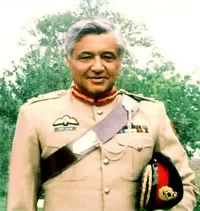Major General ® Shah Rafi Alam was a well respected officer and gentleman of Pakistan army. He was son of Shah Nazir Alam of Sehswani Sayed family and Irene. Nazir joined Indian Police Service (IPS) and was one of few senior police officers inherited by newly independent Pakistan. Nazir was Inspector General of Police of West Punjab and in 1950s was the founder and head of anti-corruption unit. In 1957, newly independent Federation of Malaya (now Malaysia) requested his services and he was instrumental in establishing the Special Crime Unit against corruption of the newly independent nation.
Rafi attended Atchison College before heading to military academy at Kakul to join 5th PMA course. He was commissioned in 1951 in 5th Probyn’s Horse. In 1955, 12th Sam Brown Cavalry was re-raised by Pakistan army. This regiment had a long history dating back to 1849. 2nd and 5th Punjab Cavalry Regiments were renamed 22nd and 25th Cavalry respectively in 1903 reorganization. In 1921 reorganization 22nd and 25th Cavalry were amalgamated to form 12th Sam Brown Cavalry. The class composition of the regiment was Dogra, Sikh and Punjabi Muslim squadrons. In 1937, it was converted to training regiment of 2nd Cavalry Group based at Ferozpur. In 1940, armored regiments of Indian army were further reduced. 12th Cavalry was absorbed into a training center along with 15th Lancers and 20th Lancers and ceased to exist. In 1955, the regiment was re-raised by Pakistan army. Shah Rafi transferred to 12th Cavalry which became his new home.
In 1965 war, 12th Cavalry fought on different fronts under the command of Lieutenant Colonel Bashir Ullah Khan Babar. Shah Rafi commanded B Squadron of his own regiment and won gallantry award of Sitara-e-Jurat (SJ). Later, he served as Brigade Major of 4th Armored Brigade then commanded by Brigadier Muhammad Nisar of 25th Cavalry (Brigade commander and his Brigade Major were both winners of SJ). Shah Rafi commanded 12th Cavalry in 1971 war. After promotion to the rank of Brigadier, he commanded 3rd Armored Brigade and commanded a division in Sialkot at Major General rank.
In 1955, MGM studio embarked on a big movie project named Bhawani Junction. Original plan was to film on location in India but when Indian government hesitated and put many conditions, the venue was changed to Lahore. Film’s stars Ava Gardner and Stewart Ganger and other crew members spent several months in Pakistan and stayed at Flatties Hotel. Pakistan government supported the venture and a battalion of 13 Frontier Force Rifles provided some of its officers and soldiers for the film. Shah Rafi was member of Lahore Polo Club and some of the cast members visited the club. Ava Gardner made acquaintance with Shah Rafi that ticked off British born Hollywood actor Stewart Granger. Rafi and Granger ended up in a scuffle.
Shah Rafi married Tameez Begum; daughter of Brigadier Mirza Masud Ali Baig nick named Hesky Baig of 5th Probyn’s Horse. Hesky Baig was from an aristocratic family of Hyderabad Deccan and had married Nawabzadi Salima Begum from the family of Nawab of Surat. Rafi’s one son married a girl from the family of Nawab of Chitral. Rafi was an excellent polo player and introduced many officers to the game. It is not clear whether Rafi had some Taimurid blood in him or it was his passion for horses that he had special affection for Tartars. He gave his children Tartar names; Changez, Qublai, Taimur and Shamyl. His children carried the torch of polo and two of his sons were members of Pakistan’s national polo team.
There is some controversy about why Chief of Army Staff (COAS) General Muhammad Zia ul Haq didn’t promote Rafi. Some are of the view that many officers like Rafi did not ascend to higher ranks because of their social habits as Zia promoted more conservative officers who were from humbler backgrounds. My view is that in view of several years of direct military rule under General Zia, many officers openly questioned continued direct military rule and these officers were not promoted further. Most of these officers were professional soldiers and expressed their views candidly and were not obsessed only with their own career. I disagree with the notion that officers like Rafi were not promoted solely because of their social habits. Many officers like Lieutenant General Jahanzeb ‘Bobby’ Arbab and Lieutenant General Fazle Haq had similar social habits. However, they agreed with Zia’s policies therefore they became close confidants of Zia. Bobby and Fazle Haq served as Corps Commanders and remained in charge of Sindh and North West Frontier Province respectively for several years during Zia’s rule.
Shah Rafi Alam was the representative of a generation of officers of Indian and Pakistan army who joined the armies of newly independent countries. This group was from the traditional aristocratic and educated elite who joined army out of passion and not as a good job opportunity. The outlook and manners of these officers were different and they were not submissive. They earned the respect of their fellow officers by professional code of conduct.
Notes
Brigadier ® Z A Khan. The Way It Was (Karachi: Ahbab Printers, 1998)
Lee Server. Ava Gardner: Love Is Nothing (New York: St. Martin’s Press, 2006)




